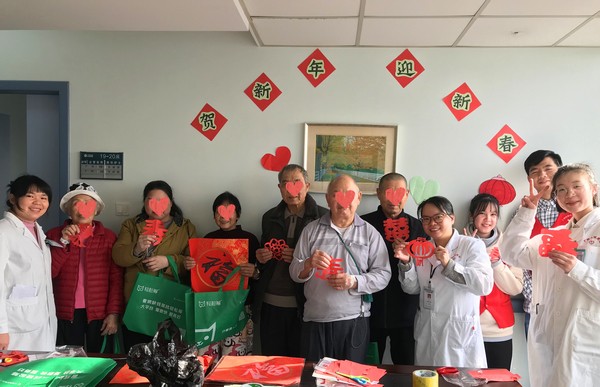Medical team wins hearts by saving sight
By Yang Han in Kampong Cham, Cambodia | China Daily Global | Updated: 2019-09-16 09:38
Medical volunteers from the Chinese mainland and Hong Kong provide free cataract surgery to patients in Cambodia's Kampong Cham province in March. [Photo/Xinhua]
In around 15 minutes, OrkSambath, who had suffered from cataracts for more than a decade, regained his eyesight after receiving surgery from a Chinese medical team.
"I am really happy that I can see things a lot more clearly now," said Ork, a 60-year-old retired teacher from the village of ChbarAmpov in eastern Cambodia's Kampong Cham province.
"Now I can explore new things in life, like traveling long distance by myself, something that could have been dangerous for me (before) due to the condition of my eyes. I can also find a new job or do some small business."
Ork was among more than 4,600 patients in Kampong Cham province who received surgery under the Belt and Road Cataract Blindness Eradication Campaign.
Initiated by the Belt and Road Hong Kong Centre, the campaign has been jointly carried out by the Asian Foundation for the Prevention of Blindness and Cambodia's Ministry of Health. Support has also come from the Hong Kong-based charity organization New Home Association, the Guangxi Zhuang autonomous region, and the Hong Kong Business Association of Cambodia.
By bringing medical volunteers from the Chinese mainland and Hong Kong, along with two large vehicles equipped with modern medical equipment, the campaign that began in May last year aims to provide free cataract surgery to about 8,000 patients in Kampong Cham province over the course of about 18 months.
With its population of 1.6 million, Kampong Cham is one of Cambodia's most populous provinces. Cataracts are a leading cause of blindness in the vast farming province.
Cataracts, which are mostly related to aging, are a clouding of the lens of the eye that prevents clear vision. Surgical treatment is usually successful in restoring sight. However, in many countries, especially in remote areas, it is still difficult for patients to gain access to surgery due to various obstacles, according to the World Health Organization.
Ork's eyesight began to deteriorate more than 10 years ago. As the symptoms worsened, he had to rely on a magnifier to read. But due to the cost of medical treatment and transportation, he never considered consulting a doctor.
The average cost of cataract surgery in Kampong Cham province is about $100 per eye, which can be a heavy burden on the province's large rural population.
"It was not until late August, when the local health center came to my village to promote the campaign, that I realized that I might have cataracts," Ork said.
It took Ork just five days to decide to have surgery, and the operation was conducted by a medical team of doctors and nurses from the People's Hospital of Guangxi Zhuang autonomous region. He took a free bus arranged by the campaign to Kampong Cham Provincial Hospital, where the medical team would carry out the operation.
"As doctors, the most fulfilling moment is when we see the patient's eyesight improve after the surgery," said team leader ZhongHaibin. The ophthalmologist said that due to a lack of proper eye care, the symptoms of many patients become quite serious over time.
Zhong's team, which arrived in Kampong Cham on Aug 19, was the ninth medical team to arrive. The team conducted a record number of 692 surgeries before heading back to China on Sept 12. A new team was expected to arrive on Monday, according to the Asian Foundation for the Prevention of Blindness.
At its peak, the team worked 13 hours continuously in one day to provide eye examinations and conduct 64 surgeries.
The medical team also worked closely with the staff of the local hospital. For example, before the campaign started, all the doctors and nurses of Kampong Cham Provincial Hospital's ophthalmology unit went to Guangxi for training.
PorNorin, head of the ophthalmology unit of Kampong Cham Provincial Hospital, is one of two eye doctors in not just the hospital, but the entire province. After the training in Guangxi and through cooperation with the Chinese doctors, he can now perform the cataract surgery using modern equipment.
"In our hospital, the cataract surgeries used to be done manually only, but now with the equipment provided by China, the result of the surgery can be greatly improved," Norin said.
The Belt and Road Cataract Blindness Eradication Campaign is an important part of Cambodia's national policy in blindness eradication and key to improving the overall eye health of its people, said Or Vandine, secretary of state at Cambodia's Ministry of Health. Development of the health sector is a government priority, she added.
Noting that Cambodia has been a firm supporter of the China-proposed Belt and Road Initiative since 2016, Vandine praised China-Cambodia cooperation, especially in the health sector.
The health sector has been a key focus of China's cooperation with Cambodia, including ensuring financial aid, building hospitals, providing treatment for children with congenital heart disease and delivering mobile clinics to serve rural communities, according to Xinhua.
"The cooperation between China and Cambodia can set an example for the world," said Vandine, adding that the BRI will help promote closer cooperation among all participating countries.
KimsourPhirum, director of the Kampong Cham Provincial Health Department, said the campaign has raised local people's awareness of cataract disease and improved people's living quality.
"The friendship between China and Cambodia will continue to be enhanced under the BRI," said Phirum, who hopes more donations of medical equipment from China will help the hospital to better serve patients.
Yin Sinath, director of Kampong Cham Provincial Hospital, said more opportunities for the ophthalmology unit's staff to receive training in China can keep them up to speed on modern medical technology and techniques.
Vandine, of Cambodia's Ministry of Health, hopes the Belt and Road Cataract Blindness Eradication Campaign can be expanded to other parts of Cambodia.










 服务号
服务号
 订阅号
订阅号
 官方微博
官方微博
